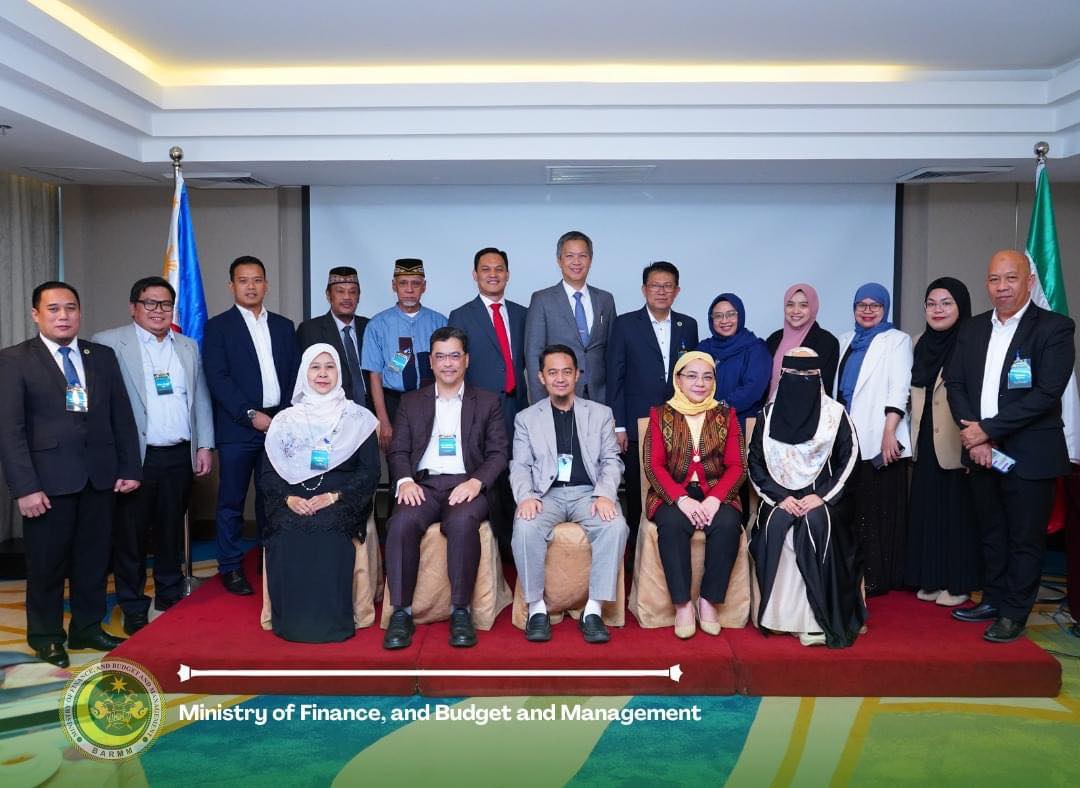
The newly-appointed Shari’ah Supervisory Board members in BARMM during their inaugural meeting on December 15, 2023, in Manila. (Photo courtesy of MFBM)
COTABATO CITY—The Shari’ah Supervisory Board’s (SSB) appointed members will play a key role in overseeing Islamic financial operations, which reflects a focused effort to ensure adherence to Shari’ah principles in the Bangsamoro region’s financial practices, marking a significant move toward ethical and compliant finance.
BARMM Chief Minister Ahod Ebrahim emphasized during the SSB’s inaugural meeting on Dec. 15, in Manila that the board serves as a key element and a powerful tool, reinforcing the commitments of the Bangko Sentral ng Pilipinas (BSP), the Department of Finance (DOF), and the National Commission on Muslim Filipinos (NCMF) to financial stability grounded in sound corporate governance.
“The establishment of the SSB is not just for formality; it is a tangible expression of our shared dedication and commitment to just, equitable, ethical, and Islamic financial practices,” Ebrahim said.
“We are certain that this board, which has been tasked with overseeing Islamic banking operations, will undoubtedly help our country’s economy flourish. It is the key to releasing the vast potential of Islamic finance in our region,” The Chief Minister stressed.
The SSB in the BARMM was established through a Joint Circular signed last April 26, 2022, which was issued to implement Article XIII, Sections 32 and 34 of the Bangsamoro Organic Law (BOL).
It is tasked to issue Shari’ah opinions on Islamic banking transactions and Shari’ah products, as well as financial institutions and other stakeholders as requested by the Bangko Sentral ng Pilipinas (BSP).
Underscoring the essence of SSB, DOF Undersecretary Bayani Agabin recognized that fostering a vibrant Islamic banking and financial ecosystem is integral to the achievement of achieving genuine and inclusive prosperity for all Filipinos.
“The Bureau of Internal Revenue and the Insurance Commission have issued relevant policies on tax neutrality and ‘Tawafuq’, respectively, to support the development of Islamic banking and finance in the country,” Agabin said.
He further announced that in December, the issuance of maiden sukuk bonds worth 1 billion U.S dollars was a success.
A sukuk bond adheres to Islamic principles, foregoing traditional interest payments. Instead, it is structured as certificates backed by assets, and investors receive returns from the income generated by these underlying assets.
Agabin added, “The debut listing marks a milestone moment in the Philippine government’s efforts to strengthen the Islamic finance industry, deepen the country’s capital markets, and promote financial inclusion.”
Atty. Ubaida Pacasem, Minister of Finance, Budget, and Management (MFBM) and Vice Chairperson of the Technical Working Group on Islamic Finance for the Bangsamoro, emphasized that the establishment of the SSB is a pivotal step toward building a robust Islamic banking and finance industry.
“The General Appropriations Act of the Bangsamoro, since 2022, encourages all Ministries and Offices of the Bangsamoro Government, to the extent that it relates to their mandated functions, to formulate plans, programs, and projects intended to support the full integration and mainstreaming of Islamic Finance within their services and activities,” Pacasem said.
Dr. Mohammad Yacob, Minister of Agriculture, Fisheries, and Agrarian Reform (MAFAR) and Chair of the Technical Working Group on Islamic Finance for the Bangsamoro, expressed gratitude to development partners for their continuous support in strengthening the promotion and development of Islamic finance, contributing to the vision for a more progressive Bangsamoro.
One significant outcome of the meeting was the appointment of the SSB, with Dr. Muhammad Nadzir Ebil as the Chairperson and Ashraf Bin Md Hashim as the Deputy Chairperson. Dr. Ebil currently serves as the Dean of Graduate Studies and Kulliyah of Shari’ah at Jamiat Cotabato, while Hashim is the Chairman of the Shari’ah Advisory Council at Bank Negara Malaysia.
Other members of the SSB include Rusni Binti Hassan, Dean of the Institute of Islamic Banking and Finance at the International Islamic University Malaysia; Abdulwahid A. Inju, Mufti of the Province of Tawi-Tawi; and Salih Musa, former Shari’ah Advisor of Al-Amanah Islamic Investment Bank of the Philippines. (Kasan Usop, Jr./BIO)







